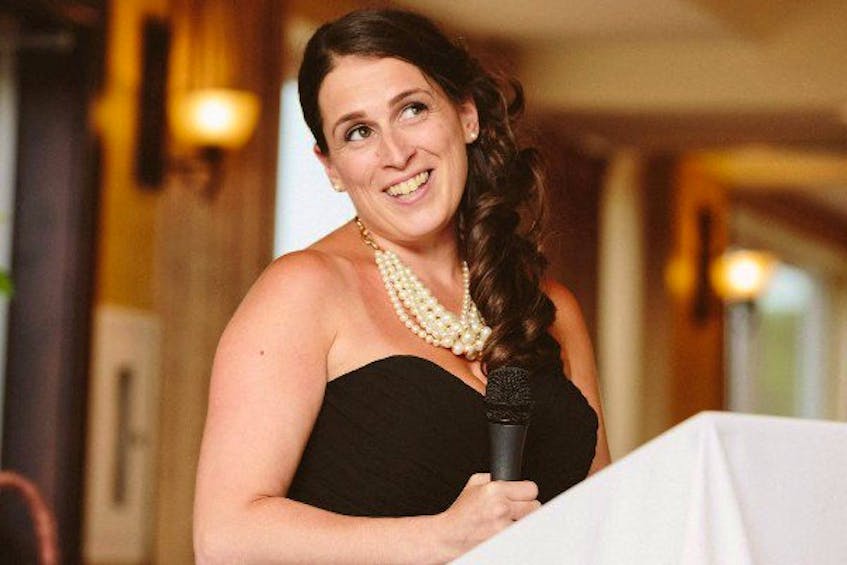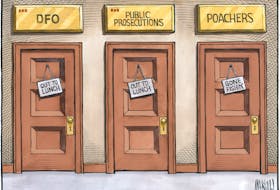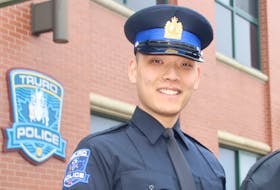Evidence from a DNA expert highlighted testimony Tuesday at a Halifax trial for two people charged with first-degree murder in the June 2017 stabbing death of Nadia Gonzales at a Dartmouth apartment building.
Laurie Karchewski, a forensic specialist at the RCMP’s national lab in Ottawa, testified about a DNA report that was tendered as an exhibit in Nova Scotia Supreme Court.
Karchewski’s report says a DNA profile matching that of Calvin Maynard Sparks was found in blood on clothing and one of the shoes worn by Gonzales, on the hockey bag in which her body was placed, and in the stairwell where the bag was discovered.
According to the report, Sparks’ DNA was also on a knife found under shrubs on a nearby property, on a fence and on grass near where the knife was located, on a T-shirt and the shoes the other trial defendant, Samanda Rose Ritch, was wearing when she was arrested at a Halifax residence the next morning, and on a stun gun seized from that home.
In addition, Sparks’ DNA was on the steering wheel and inside passenger door handle of a Honda Accord that was impounded from a Halifax parking lot more than 24 hours after the killing, the jury was told.
Jurors heard Ritch’s DNA was present in fingernail clippings taken from Gonzales’ right hand.
Nail clippings from the deceased’s left hand contained the DNA of an unknown male, Karschewski said in the report.
Sparks, 26, of Dartmouth, and Ritch, 22, of Halifax, are also accused of attempting to murder John Patterson, who was with Gonzales on the evening of June 16, 2017, when they were attacked in a hallway at 33 Hastings Dr.
The trial got underway Nov. 4. A jury of nine men and four women is hearing the case, with Justice Christa Brothers presiding.
Patterson, 72, testified early in the trial that he went to the apartment building with Gonzales, a 35-year-old mother of two from Hammonds Plains, to deliver crack cocaine to Wayne (Batman) Bruce, who lived on the fourth floor.
Gonzales and Patterson were stabbed outside Bruce’s apartment. Two people wearing dark hoodies were seen running from the area after the incident and cutting through a nearby backyard.
Patterson suffered six stab wounds before escaping the building and collapsing on the lawn of an elementary school across the street.
The trial heard Tuesday that Gonzales’ DNA was on the knife found under the shrubs, on a second knife found in the hockey bag, on a broken knife blade found in the fourth-floor hallway, on the hockey bag, on the stun gun, and on the passenger seat of the Honda.
Patterson’s DNA was found in blood on a wall in the apartment building.
In cross-examination, Karchewski said the male DNA in the fingernail clippings did not match the known samples in the case. Nor did it match any profiles in the national DNA database.
She confirmed that DNA from two individuals, at least one of whom was male, was found on a sawed-off shotgun seized from Bruce’s apartment a few days after the killing. But she said the samples were of insufficient quality for the lab to generate a DNA profile for comparison.
“Basically, … you can conclude that DNA from a certain source was located, detected, found at a certain place, but you can’t say how it was deposited there or when it was deposited there,” suggested defence lawyer Malcolm Jeffcock, who represents Sparks.
“Yes, that’s correct,” Karchewski said.
Earlier Tuesday, the jury heard recordings of portions of six phone calls Sparks placed from the Central Nova Scotia Correctional Facility in Dartmouth in June 2017 after his arrest, as well as testimony from two Halifax Regional Police forensic identification officers.
More evidence will be called by the Crown on Wednesday afternoon.









